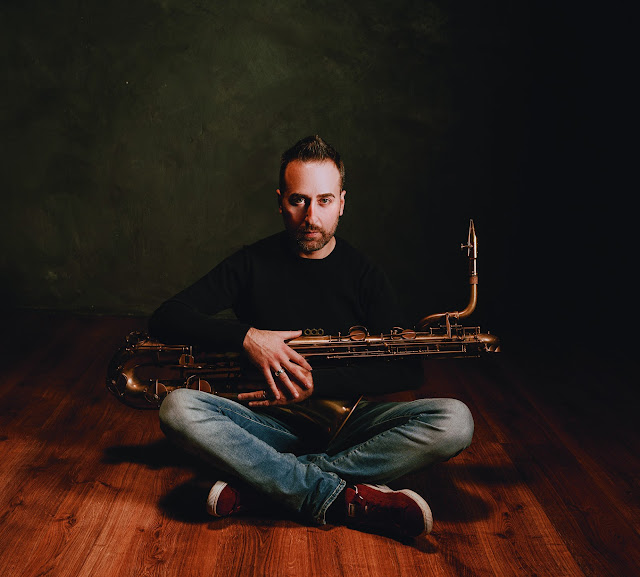Andrea Abbadia Quartet – Change (Dodicilune, 2025)
Il baricentro interiore, tra groove, deserto e risveglio
Ci sono dischi che nascono da un’urgenza. Non quella di pubblicare, ma di raccontare un passaggio, una frattura, un nuovo inizio. Change, del sassofonista baritono Andrea Abbadia, appartiene a questa categoria rara. È un lavoro che non cerca l’effetto, ma la verità. E la trova in una trasformazione profonda, dichiarata sin dal titolo.
Con questo album, Abbadia ci guida in un viaggio musicale intenso, evocativo, concettualmente stratificato. È un disco che segna una tappa decisiva nella sua evoluzione artistica, un punto di non ritorno. E lo fa rovesciando le convenzioni: il sax baritono, strumento spesso confinato al ruolo di supporto, qui prende il centro della scena. Diventa voce leader, narratore, coscienza. Lo fa con una sonorità ruvida e insieme lirica, capace di scendere nel profondo senza mai diventare manierata.
Attorno a lui, un quartetto stabile – e lo si percepisce all’istante – composto da Lello Petrarca (pianoforte e rhodes), Luca Varavallo (contrabbasso) e Alex Perrone (batteria). A questi si aggiunge, nel brano di chiusura, il violoncellista Antonio Merici, che contribuisce ad amplificare la componente emotiva del lavoro. Insieme costruiscono un paesaggio sonoro che alterna scrittura e improvvisazione, rigore e libertà, sempre in perfetto equilibrio.
Il concept di Change affonda le radici in una trasformazione interiore, quasi spirituale. Abbadia parla apertamente della necessità di rinunciare alle certezze superficiali, per scendere in profondità, per abitare il proprio deserto. Non è un disco autocelebrativo, non c’è alcuna retorica. C’è, semmai, il rigore di chi ha scelto di scavare. Le otto tracce che compongono il disco sono altrettanti capitoli di questo percorso.
La title-track, Change, apre il lavoro con un tema incisivo, pervicacemente evocativo. Il sax baritono guida, ma non impone. La sezione ritmica pulsa, respira, accompagna come in una danza di ascolto reciproco. È una dichiarazione d’intenti, senza proclami.
Just a Ride – firmata da Luca Varavallo e Francesco Girardi – prende spunto da un celebre monologo di Bill Hicks: “È solo un giro di giostra.” E davvero, il brano ha un andamento fluido e narrativo, come una spirale che cattura e porta altrove. Le armonie sospese e la coesione del quartetto rendono il tutto ipnotico, quasi onirico.
Dying to Oneself è probabilmente il vertice emotivo del disco. Una lenta immersione nell’ombra, dove il dialogo tra sax e pianoforte è fitto di silenzi, pathos, domande. La citazione di A Love Supreme non è un esercizio di stile, ma una forma di appartenenza. Una preghiera laica, un gesto di riconoscenza.
Con Women, scritto a sei mani da Abbadia, Varavallo e Catria, si apre uno spazio diverso. Il groove è sofisticato, ma mai compiaciuto. Le soluzioni armoniche lasciano spazio all’espressività dei singoli, mentre il quartetto si muove con grazia tra forza e vulnerabilità.
Know-How, ancora frutto della penna di Varavallo e Girardi, mette in luce un’altra qualità del gruppo: la capacità di affrontare intrecci ritmici complessi senza perdere fluidità. Il pianoforte di Petrarca, qui, regala momenti di autentica eleganza, tra controllo e scintille improvvise.
In Ubuntu, il titolo è già una dichiarazione. Il concetto africano di interdipendenza umana trova eco in una costruzione musicale calda, partecipata. Ogni strumento è voce, ma è nel coro che si rivela il senso più profondo del brano. È un inno alla connessione, e lo si sente.
Song for Andrew, composto da Petrarca, è un gesto d’affetto musicale, misurato e sincero. Il piano guida con tocco cantabile, mentre il sax baritono interviene con pennellate sottili, mai invadenti. Un momento di respiro e gratitudine.
Chiude il disco Francesco e le Rondini, tributo a Lucio Dalla e a San Francesco, due figure che, a modo loro, abitano lo stesso cielo interiore. Il violoncello di Merici aggiunge spessore e malinconia. È una conclusione poetica, sospesa, come il volo di una rondine che sparisce all’orizzonte.
Nelle liner notes, Javier Girotto parla di “maturità estrema”, lodando la crescita musicale di Abbadia e la straordinaria sintonia del quartetto. E in effetti è questa la forza di Change: non la perfezione tecnica – pur presente –, ma la capacità di andare oltre. Di lasciar parlare qualcosa che non ha nome.
È un disco calato pienamente nel presente, ma con lo sguardo rivolto oltre. Affascina senza cercare scorciatoie, coinvolge con sincerità. E dimostra che, quando il cambiamento è reale, la musica può farsi gesto autentico.
La copertina è firmata dalla fotografa Sara Iorio, arricchita da scatti supplementari di Pina Ciervo. L’immagine comunica con delicatezza e forza il viaggio interiore e spirituale che attraversa l’album, traducendo in un linguaggio visivo suggestivo il tema del cambiamento.
Track list:
Change
Just a Ride
Dying To Oneself
Women
Know-How
Ubuntu
Song For Andrew
Francesco e le Rondini
Andrea
Abbadia – sax baritono
Lello Petrarca – pianoforte e rhodes
Luca Varavallo – contrabbasso
Alex Perrone – batteria
Antonio Merici – violoncello (ospite in Francesco e le Rondini)
Prodotto da Andrea Abbadia e Maurizio Bizzochetti per Dodicilune
Registrato il 30 e 31 gennaio 2025 e mixato il 1° febbraio 2025 presso gli Artesuono Recording Studios di Cavalicco (Udine), Italia
Ingegnere del suono: Stefano Amerio
English version
Andrea Abbadia Quartet – Change (Dodicilune, 2025)
The Inner Center of Gravity, Between Groove, Desert, and Awakening
There are albums born out of urgency. Not the urgency to publish, but to recount a passage, a fracture, a new beginning. Change, by baritone saxophonist Andrea Abbadia, belongs to this rare category. It’s a work that doesn’t chase effect but seeks truth—and finds it in a deep transformation, declared right from the title.
With this album, Abbadia leads us on an intense, evocative, and conceptually layered musical journey. It marks a decisive milestone in his artistic evolution—a point of no return. And he does so by overturning conventions: the baritone saxophone, often relegated to a supporting role, here takes center stage. It becomes the leading voice, the narrator, the conscience. Its sound is both rough and lyrical, capable of going deep without ever becoming mannered.
Around him is a tightly knit quartet—you can feel it instantly—featuring Lello Petrarca (piano and Rhodes), Luca Varavallo (double bass), and Alex Perrone (drums). Joining them on the closing track is cellist Antonio Merici, whose contribution amplifies the emotional weight of the work. Together, they craft a soundscape that moves between composition and improvisation, discipline and freedom, always in perfect balance.
The concept of Change is rooted in an inner, almost spiritual transformation. Abbadia openly speaks of the need to renounce superficial certainties in order to dive deeper, to inhabit one’s own desert. This is not a self-congratulatory record; there’s no rhetoric here. Rather, there’s the rigor of someone who has chosen to dig. The eight tracks that make up the album are like chapters in this journey.
The title track, Change, opens the work with a sharp, persistently evocative theme. The baritone saxophone leads without overpowering. The rhythm section pulses, breathes, accompanying as in a dance of mutual listening. It’s a declaration of intent, without proclamations.
Just a Ride—written by Luca Varavallo and Francesco Girardi—takes inspiration from Bill Hicks’ famous monologue: “It’s just a ride.” And indeed, the piece unfolds with a flowing, narrative quality, like a spiral that pulls you in and carries you elsewhere. The suspended harmonies and the quartet’s cohesion make it hypnotic, almost dreamlike.
Dying to Oneself is arguably the emotional apex of the album: a slow immersion into shadow, where the dialogue between sax and piano is dense with silences, pathos, and questions. The nod to A Love Supreme isn’t mere homage but a sense of belonging—a secular prayer, a gesture of gratitude.
With Women, co-written by Abbadia, Varavallo, and Catria, a different space opens up. The groove is sophisticated yet never self-indulgent. Harmonic solutions leave room for the expressiveness of the individual musicians, as the quartet moves gracefully between strength and vulnerability.
Know-How, also penned by Varavallo and Girardi, highlights another quality of the group: their ability to navigate complex rhythmic textures without losing fluidity. Here, Petrarca’s piano offers moments of genuine elegance, balancing control and sudden sparks of improvisation.
In Ubuntu, the title itself is a statement. The African concept of human interdependence resonates through a warm, participatory musical construction. Each instrument has its voice, but it’s in the chorus that the piece’s deepest meaning emerges. It’s a hymn to connection, and you can feel it.
Song for Andrew, composed by Petrarca, is a musical gesture of affection—measured and sincere. The piano leads with a singing touch while the baritone sax adds subtle brushstrokes, never intrusive. A moment of breath and gratitude.
The album closes with Francesco e le Rondini, a tribute to Lucio Dalla and St. Francis—two figures who, in their own way, inhabit the same inner sky. Merici’s cello adds depth and melancholy. It’s a poetic, suspended conclusion, like the flight of a swallow disappearing on the horizon.
In the liner notes, Javier Girotto speaks of “extreme maturity,” praising Abbadia’s musical growth and the quartet’s extraordinary synergy. And indeed, this is the strength of Change: not technical perfection—though that is present—but the ability to go beyond. To let something nameless speak.
It’s an album fully rooted in the present yet with its gaze fixed on what lies beyond. It captivates without shortcuts, engages with sincerity, and proves that when change is real, music can become an authentic act.
The cover, shot by photographer Sara Iorio and enriched by additional images from Pina Ciervo, delicately yet powerfully conveys the inner and spiritual journey that runs through the album, translating the theme of transformation into a suggestive visual language.
Track list
Change
Just a Ride
Dying To Oneself
Women
Know-How
Ubuntu
Song For Andrew
Francesco e le Rondini
Personnel
Andrea Abbadia – baritone saxophone
Lello Petrarca – piano and Rhodes
Luca Varavallo – double bass
Alex Perrone – drums
Antonio Merici – cello (guest on Francesco e le Rondini)
Produced by Andrea Abbadia and Maurizio Bizzochetti for Dodicilune
Recorded on January 30–31, 2025 and mixed on February 1, 2025 at Artesuono Recording Studios, Cavalicco (Udine), Italy
Sound engineer: Stefano Amerio


